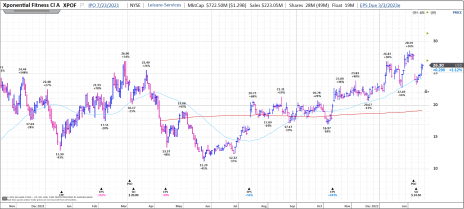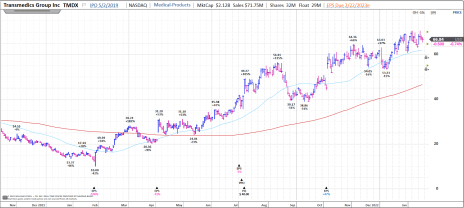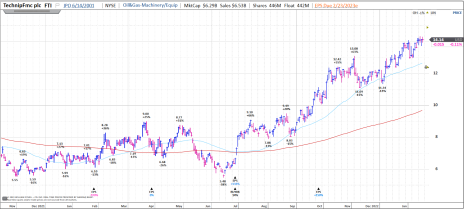With the market having changed character for the better in 2023, more stocks are trading based on company-specific fundamentals than macro events.
Yes, inflation and interest rate trajectories are still a concern. But the market seems to be increasingly comfortable with the range of possible outcomes this year.
While things can change at any time, the current environment is much more conducive to stock picking than at any time in 2022.
Given that, I wanted to share high-level notes on three small-cap stocks that look intriguing to me for the rest of the year.
[text_ad]
Small-Cap Stock #1: Xponential Fitness (XPOF)
Xponential Fitness (XPOF) is the largest franchisor of boutique fitness brands in the U.S. with over 2,000 studios across 48 states. It also has over 175 studios open in 11 foreign markets. Xponential Fitness has a market cap of $1.3 billion.
The company’s brands cross several verticals including Pilates (Club Pilates), barre (Pure Barre), cycling (CycleBar), rowing (Row House), dance (AKT), yoga (YogaSix), running (Stride), boxing (Rumble), functional training (BFT), and stretching (StretchLab).
Xponential offers small class sizes in easy-to-access retail locations, often with several brands located in a “fitness row.”
In January management announce it expects to meet the high end of its 2022 guidance. That currently has analysts looking for Q4 revenue of $66.8 million (+35%) and EPS of $0.07. That implies full-year 2022 revenue of $240 million (+55%) and EPS of $0.13, up from a loss of -$0.59 in 2021.
When management reports earnings on March 2 investors will be looking for 2023 guidance that exceeds consensus of $290 million (+21%) and EPS of $1.00, up a massive 670% over 2022.
Small-Cap Stock #2: TransMedics (TMDX)
TransMedics (TMDX) is a MedTech company addressing the unmet market need for more and healthier organs for transplantation. Specifically in the heart, lung and liver markets. It has a market cap of $2.1 billion.
The company’s revolutionary technology is called the Organ Care System (OCS). OCS replaces a very old standard of care, cold storage, that is too static to meet the dynamic needs of today’s organ transplant market.
The elevator pitch is that the OCS does a better job at preserving organ quality, assessing organ viability prior to transplant, boosting organ utilization and slashing transplant costs.
This is good for patients (better access to life-saving transplants and quicker recoveries), hospitals (higher transplant volumes, better procedure economics) and for insurance payers (more cost-effective treatment for end-stage organ failure and lower post-transplant complication costs).
The OCS is also the foundation of TransMedics’ National OCS Program (NOP), a turnkey solution for transplant centers that provides outsourced organ retrieval and OCS organ management.
The goal of the NOP is to streamline delivery of donor organs from anywhere in the U.S. to a transplant center.
This is very much an emerging platform technology and therefore there are risks. Growth can be rapid, but also a bit lumpy given the early-stage nature of the business.
In Q3 2022, revenue grew by 378% and analysts are looking for growth of 153% (to $24.5 million) in Q4, which will be reported next Wednesday, February 22. Implied full-year 2022 revenue is $90 million (+197%) and adjusted EPS of -$1.33.
Looking into 2023 analysts expect revenue of $130 million (+44%) and EPS of -$1.00. Suffice it to say that number could be vastly different after next week’s earnings report.
This stock carries significant risks, however, the recent trend of beat-and-raise quarters and solid execution suggest more good news ahead.
Small-Cap Stock #3: TechnipFMC (FTI)
TechnipFMC (FTI) is the largest pure-play provider of integrated deep-water offshore oil and gas development solutions. It sells all types of subsea equipment and controls and also provides subsea engineering and construction services.
The company has a market cap of $6.3 billion.
TechnipFMC’s front-end teams work with customers early on to gain a holistic understanding of the clients’ needs. By building out its integrated engineering, procurement, construction and installation (iEPCI) capabilities, along with its Subsea 2.0 platform of modular technologies and fleet of specialized vehicles, TechnipFMC can now deliver and install equipment from the sea floor to the surface.
These integrated solutions drive cost savings and production efficiencies for clients. That has helped the company build a loyal and increasingly profitable customer base.
Management says that around 70% of subsea bookings are now directly awarded, including those from integrated Front-End Engineering and Design (iFEED) projects and partnerships. Direct award projects include more favorable pricing terms than competitive bids.
Another driver of profit margin growth is a configure-to-order (CFO) manufacturing model (reduces inventory, lowers capital requirements), which pairs well with the company’s modular Subsea 2.0 architecture.
Revenue contraction of -2% in 2021 has flipped positive in the last two quarters and should come in at about 4% for full-year 2022 (9% revenue growth expected in Q4), then accelerate to 10% in 2023. Expected EPS of $0.10 in 2022 should step up very nicely (about 410%) to $0.51 in 2023.
Earnings are due out next Thursday, February 23.
You can learn more about all the stocks I’m recommending right now, with a subscription to Cabot Small-Cap Confidential and Cabot Early Opportunities.
[author_ad]




